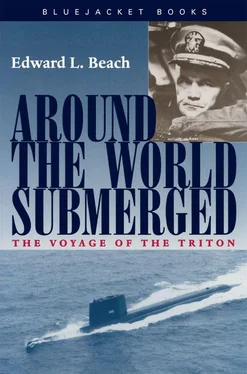“But Admiral,” protested the EB man, “there’s no need to subject the bearing to additional stress. We’ve already satisfied the design specs, and there’s no point to going further …”
Admiral Rickover’s voice held a curiously flat, monotonous tone, which I had heard before. “We’re here to find out if this ship is satisfactory for war. I’ll not let this piece of lousy designing stop the trial, and I’ll take the responsibility if it breaks down!” There was a singular lack of emphatic expression in the way Rickover spoke, effectively belied by the flinty look in his eyes.
Within minutes, Les Kelly had a squad of his men dragging a rubber hose to the vicinity, and a spray of salt water was played upon the steel box enclosing the defective bearing and its oil supply. A constant check of the oil temperature was set up, with results reported to Admiral Rickover and, upon my private instructions to Les, to me. In the meantime, Triton had not slowed her headlong dash through the water, and after a few more minutes, to our relief, the lube oil temperature from the starboard propeller shaft spring bearing stopped its steady rise.
We watched it carefully from this point on, and the design for a permanent “fix”—installation of the oil-cooling system which should have been there from the beginning—was complete in all essentials by the time Triton returned to the EB docks. Except for our natural concern that the temperatures continue to remain under control, the bearing gave us no further trouble, the all-out power test continued, and Admiral Rickover, with Les Kelly’s stethoscope forgotten in his pocket, went back to his tool chest and his book.
Both Les and I were greatly heartened by the outcome of the apparent breakdown, for, like all officers attached to Triton, we wanted more than anything else to know her real ability to respond when the chips were down. Should an emergency occur, we might have need of that extra little response—perhaps sooner than any of us could then anticipate.
As the trials progressed, the thrill of watching a magnificent engineering plant out-perform the highest expectations worked its heady magic on even Admiral Rickover. We kept every critical bearing and every mechanism under special surveillance, and maintained power, running hundreds of miles south in the process. With the over-steam-demand alarms sounding their piercing, ringing, hornlike noise throughout the vast engineering spaces, every indicator on the reactor and electric control panels touching—but not exceeding—its maximum-allowed value, the great reduction gears and turbines shrilling their joyful song of superhuman strength and dependability, Triton, deeply submerged, roared through the water with the speed of an express train.
It is, unfortunately, not within the province of this narrative to state the speed actually achieved by our ship, nor any of the specific parameters of her power plant, but I don’t suppose there can be any objection to revealing the title of the book Vice-Admiral Rickover was reading. I had snatched a glimpse of the name on the cover when it lay temporarily unguarded on the tool box. It was The Memoirs of a Renaissance Pope.
There are those who have claimed that the faster Triton went, the more slowly the Admiral read, and that toward the end he turned the pages very slowly indeed, if at all. As to this, I cannot testify, for I could not remain in the engine room; but my memory does record the impression, after the many hours and so very many miles, that the blank look he wore could only be a mask for his true delight.
The trials, an unqualified success in every way, became difficult only once, as a result of my own failure to appreciate fully the forces with which we were dealing. One of the tests required that the ship be operated submerged in the astern direction. I had done this before with Piper, Amberjack, and Trigger II, but I knew very well that it might be considerably more difficult with Triton, since she was much longer and bigger, and proportionately even more slender than they. She was also infinitely more powerful, a factor which I felt would tend to equalize the situation.
Some time after the completion of the main power trials, after a number of other evolutions had been successfully demonstrated, I directed Thamm, who was now OOD as well as Diving Officer of the Watch (the ship, deeply submerged, had no need for an officer at the periscope station in the conning tower), to reverse the engines and operate the ship astern.
“All stop,” barked Thamm. “All back two-thirds.”
We could feel the great bronze propellers swinging to a stop and picking up speed in the reverse direction. Our speed indicator began to slow rapidly, reached zero, where, unable to indicate reverse speeds, it stayed. Slowly we felt Triton gathering sternway, and Tom reversed the direction of action of his bow and stern planes in order to maintain correct depth. For a time all went very well, but then the ship began to oscillate with a great, slow seesaw motion, and at the same time she slowly increased depth. At first this was of no particular concern, but soon I realized that we were getting close to the ocean floor, and that a submarine of our great length could not be allowed to oscillate through very much of an angle before there might be danger of her striking bottom.
“Sounding!” I ordered.
The answer came back quickly. “Three hundred feet!”
Tom looked at me but said nothing. I knew what he was thinking.
“All stop!” I said. “All ahead two-thirds.”
But still our speed indicator remained fixed on zero, and still our depth increased. Inexorably, we were approaching the bottom of the ocean.
Our speed was so low that touching bottom would hardly bother Triton ’s strong hull, but there was always the danger of our hitting a rock with our vulnerable propellers or the delicate sonar equipment in the bow.
I ordered another sounding. The answer this time was two hundred feet.
“Tom,” I said urgently, “blow all main ballast!”
All of us watched the Ballast Control Panel, and it seemed as if everyone in the control room was also watching me. Fitzjarrald opened the blow valves on the Diving Control Panel, blew the main ballast tanks for a long minute, then stopped on Thamm’s order.
“Blow them again,” I ordered.
But the depth gauges continued to revolve, though more slowly. Triton had not yet reached an even keel and was now down some ten degrees by the bow. If we gathered headway in this attitude, she might ram her nose against the ocean floor.
“All stop!” I snapped a second time, “Sounding!” And for the third time, “Blow main ballast tanks! Again!”
“Forty feet,” called the sailor at the fathometer.
Triton ’s angle of inclination reduced, approached zero, and the depth gauge showed that the ship was rising.
“All ahead two-thirds,” I ordered again, and heaved a sigh of relief.
It had been a thrilling moment, one which had come upon us by surprise and which could have done damage to our new ship. Mentally, I kicked myself for not having recognized the signs earlier; we should not have allowed the ship to back for so long or the oscillations to become so severe. But all that really mattered was that damage had been averted, and as we were proceeding back to port on completion of the trials, Admiral Rickover announced to the crew that our tests were among the most successful under-way trials of a nuclear ship yet carried out.
Altogether, there were about five days of initial sea trials before the Bureau of Ships and the Navy Department expressed themselves as satisfied. As always, a number of minor deficiencies were discovered, none of them serious. We went to sea several times more to check out one item or another until, finally, on the thirtieth of October, came what is called the Preliminary Acceptance Trials (PAT). On such occasions, a regularly constituted board of officers comes from Washington, D.C., to see whether the ship conforms to the operational standards specified when the contract was signed. The report of the trial board would decide whether General Dynamics would receive its entire fee for construction, whether any deductions for nonfulfilment of the contract were to be invoked, and whether Triton would be accepted for “unlimited service” or under some temporary restriction.
Читать дальше












